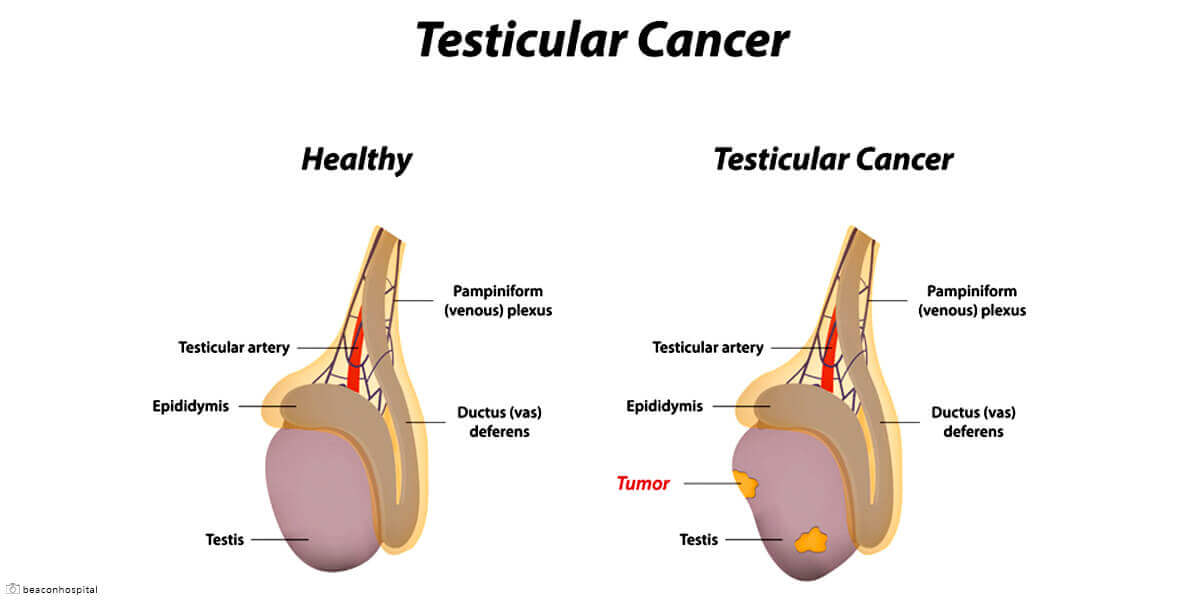Testicular cancer is very rare; in the UK around 2,200 men are diagnosed with testicular cancer every year. That equates to 1 out of every 100 cancers (1%) diagnosed in men. Whilst medical professionals do not know what causes most testicular cancers, there are some risk factors that can increase your chance of developing it.
Firstly, it is important to note that having a risk factor does not mean you will get cancer and it also follows that not having any of the risk factors will not guarantee that you won’t develop testicular cancer either. Some of the risk factors include undescended testicles (cryptorchidism), carcinoma in situ which means that there are abnormal cells inside the testicle that are not cancerous, fertility issues, previous testicular cancers, and a family history of testicular cancer.
It is really common to find lumps and bumps in the testicles which are usually harmless fluid-filled cysts and the vast majority are not the sign of anything more serious. What is really important to remember when considering testicular cancer, is that despite it being rare and whether you have any risk factors or not, is to at least once a month check your testicles and scrotum for changes. Be observant of any of the symptoms of testicular cancer and if you do notice an alteration then do not hold back from seeing your GP.
Symptoms of testicular cancer include an ache in one or both testicles, a feeling of heaviness in the scrotum, and the most common symptom is a lump that is attached to the testicle rather than free moving. These lumps are often painless and can feel like a piece of gravel; if the lump can move around the scrotum then it is unlikely to be cancerous. However, not all cancers present in this way and pain can be a symptom as well. The key thing to remember is that if you develop a lump, whether it is painless or painful, get it checked. If your scrotum feels different get it checked and create an alarm on your phone or reminder on your calendar to remind you to examine your own testicles once a month.
How do you check your balls thoroughly?
It’s not comfortable, you do need to be quite firm, but essentially you need to proceed from top to bottom. The best way to do this is starting at the top of the testicle and squeezing it in a rotational movement all the way down to the bottom. It’s not the most pleasant of sensations, which means a lot of men do not examine their scrotum properly. While it may be uncomfortable, it is a really good habit to get into as it could very well save your life.
How does cancer present itself?
Testicular cancer can present in two ways, it can be an isolated lump that will not spread and can be removed along with one testicle or it can be the type of cancer that can spread to the lymph nodes. The latter is more aggressive and may lead to removal of the testicle, some lymph nodes and a period of chemotherapy and radiotherapies to prevent any risk of cancer spreading. Fortunately, the chances of cancer recurring in most cases is very low. The best diagnostic tool for both types is a scan, which is the most comprehensive way to determine if a person has testicular cancer. A blood test can also be an indicator of cancer as high hCG (human chorionic gonadotropin) levels can also be a symptom.
The main point is that there should be no stigma attached to checking your own testicles regularly, and if there are any changes then make the call and let your doctor check them too.
About Dr Jeff Foster

A Men’s Health specialist and Medical Director and founder of H3 Health. I’m passionate about raising awareness of all aspects of Men’s Health, and heavily involved in both teaching and health promotion. I’m a committee member of the British Society of Sexual Medicine, and have been involved in writing the most recent national guidelines for testosterone deficiency in men.
Get in touch with Dr Jeff
If you are a prospective patient and wish to see Dr Jeff privately, then you can book an appointment via H3 Health (03309 120769 – National Rate). Alternatively if you are a member of the Media, then please use our contact form for media enquiries.




